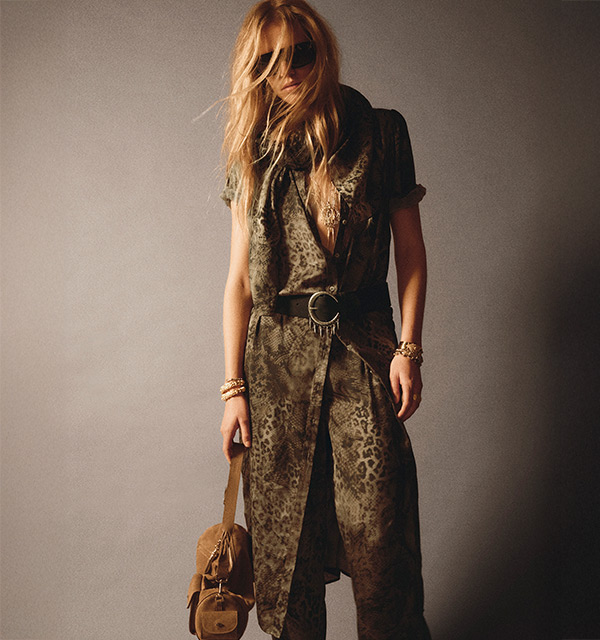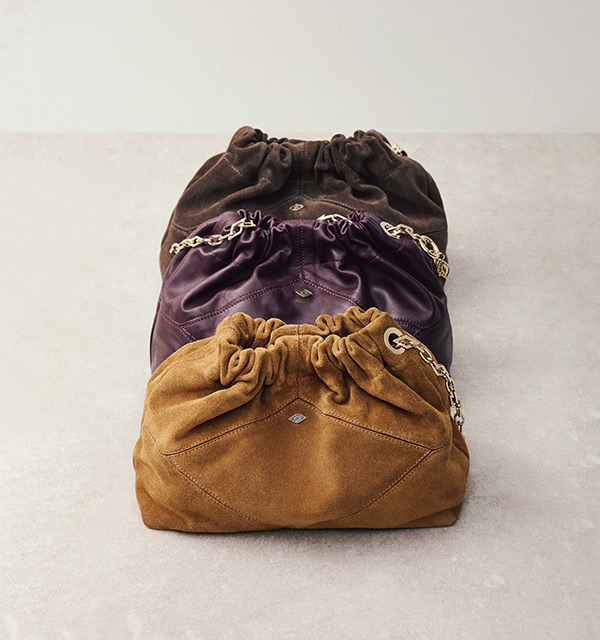MADE TO LIVE MANY LIVES
To walk on the bright side means offering clothes and accessories made to live many lives: timeless pieces made from materials that not only stand the test of time, but also age beautifully, can be repaired, and therefore kept a long time, as well as be reused and repurposed. Clothes that are ready to live a new life thanks to our partners, whether nonprofits or fashion schools.
OUR CARE GUIDE
ba&sh second hand
ba&sh is offering you the chance to clear out your wardrobe and put your old items back for sale – to give them a new life! How? Just drop your items off at one of our participating stores or send it to the ba&sh workshop free of charge. Here, your piece will be reconditioned: authenticated, checked for quality and cleaned using an environmentally friendly antibacterial product. In exchange, you'll receive a voucher valid for the new collection (online or in store) as well as our selection of second-hand pieces. Available in France, Germany, Belgium, the Netherlands, Spain, and soon in the United Kingdom and all European countries where ba&sh first-hand products are available!
Still not sure? All second-hand items on our site are timeless and high quality – ba&sh’s signature style.
In 2024, nearly 22,300 second-hand items were collected and more than 12,200 found a new home!


Don’t worry, there is always a solution
How to tuck a pulled stitch into a jumper
We've all seen that moment when one of pieces of jewellery or our fingernails catches a strand in our jumper and creates a pulled stitch. First of all, the particularity of knitwear is that it can't be cut up, because the same yarn is knitted to make the whole jumper. So, as it will be impossible to reknit your jumper at home, here are a few steps to tuck in this pulled stitch in 3 easy steps.
Materials: Crochet hook or safety pin (be careful to choose the right size for the fineness of your yarn, the finer your stitch, the finer your hook needs to be).
Steps:
- Turn your jumper inside out and pass your crochet hook or safety pin through the space of one stitch on the right side of the jumper.
- Catch the stitch pulled through with the hook or safety pin on the right side of your jumper and bring it inside.
- Once the stitch has been pulled to the wrong side, stretch your jumper slightly across the width so that the knitwear fits again.
How do I shorten a product?
Materials: small scissors, thread, needle, sewing machine, tape measure, ruler.
Steps:
- Write down the measurement to be shortened.
- Fold the excess fabric inwards until you have a satisfactory length.
- Iron the hem you have just formed.
- Leave a hem of 3 to 4 cm and trim off any excess.
- Zigzag stitch or overlock the clean edge.
- Redo the invisible hem by hand with a needle: on one side, stick the needle into the hem fabric 1 cm below the top edge. Tie a knot. Stitch every centimetre, using just one thread each time. Go around the hem and finish with a knot.
How do I sew on a button?
Materials: small scissors, thread, needle, tape measure.
Steps:
- Pass the thread through the cat of the needle, leaving 30cm on each side.
- Measure the distance between the buttons, marking the position of the button.
- Tie a knot by passing the needle twice under the button placket.
- Make 3 to 4 passes through the button holes.
- Make 5/6 turns under the button with the thread, finishing with a knot.
- Cut off the excess thread.
Upcycling defective products
Since 2023, ba&sh has partnered with a professional reintegration network to produce upcycled creations on a large scale. Thanks to this collaboration, our damaged or defective products are given a new lease on life.
Upcycling our store displays
A focus on repurposing our store displays
Every year, ba&sh donates its unused window displays to Réserve des Arts, an association dedicated to culture and creativity that collects and makes them available to art students and professionals.

Frequently asked questions
Raw materials account for 58% of our carbon footprint. Hence, they constitute an essential lever for reducing our impact. To reduce our greenhouse gas emissions and help preserve biodiversity, we select our materials with care, always choosing the best possible option, such as organic or recycled fibres, or certified materials that guarantee animal welfare and sustainable pasture management, based on labels with the highest standards.
And when the best option is not possible - due to lack of supply, for instance - we select the next best alternative.
To find out more, visit the “Materials” section of our website.
Since 2019, ba&sh has assessed its carbon footprint yearly, using the GHG Protocol methodology across all its direct and indirect activities.
In 2024, ba&sh's activities generated 65,576 tonnes of CO₂e, equivalent to driving around the world 7,528 times or flying 37,020 times between Paris and New York.
Between 2023 and 2024, ba&sh reduced its carbon footprint by 5%.
This reduction has been made possible thanks to 4 key action levers: increasing the proportion of certified materials in our collections, reducing air transport, cutting our production volumes and switching to less carbon-intensive, renewable energy for our infrastructures (sales outlets, warehouse and head office).
ba&sh has established a strict social compliance policy, which is appended to the General Terms and Conditions signed by all suppliers.
We require direct suppliers to conduct a social audit every 2 years. We recognise only the most demanding international standards: BSCI, SMETA, WCA, ICS. Suppliers are assessed on social performance criteria including: working conditions, remuneration, decent working hours, health and safety, rights to freedom of association and collective bargaining, environmental protection... Following the audit, ba&sh works together with suppliers in implementing corrective measures to address any non-compliance.
Since 2023, ba&sh has been a member of Amfori, a business association that helps companies improving working conditions in their supply chains. As of this year, we will also be conducting environmental audits in our denim laundries.
In 2024, 94% of our tier 1 production sites had been audited.
Our goal is to have 100% of our Tier 1 production sites audited by 2025, and 30% of our Tier 2 sites by 2028.
To find out more, visit the "Partners" section of our website.
In 2024, 53% of our production came from medium-haul import regions (Europe, North Africa, Turkey) while 47% came from long-haul import regions (China, India). Between 2021 and 2024, 7% of our production was relocated from Asia to Europe and North Africa.
We have no intention of stopping here: by 2028, we aim to have 60% of our production sourced from medium-haul import regions (Europe, North Africa, Turkey) and 40% from long-haul import regions (China, India).
To find out more, visit the "Partners" section of our website or read our sustainability report.
B Corp™ certification is based on an assessment of a company's overall impact in seven key areas: Mission & Stakeholder Governance, Climate Action, Human Rights, Fair Labor, Justice, Equity, Diversity & Inclusion, Environmental Management & Circularity and Public Affairs & Collective Action. This assessment is conducted using a comprehensive questionnaire which the company must complete itself, providing documents to support each claim.
To achieve certification, a company must score over 80 points. The evaluation process is demanding and rigorous. In the case of ba&sh, it lasted 18 months.
As a B Corp™, we’re part of a global community of businesses that meet high standards of social and environmental impact.
Our animal welfare policy has recently been updated in line with the recommendations of animal welfare nonprofit Four Paws, who has also reviewed our policy. This document is appended to our General Terms and Conditions, which are signed by all suppliers.
In concrete terms:
- ba&sh is committed to increasing its share of certified animal raw materials (RWS, RMS, GRS) to 70% by 2028. The RWS, RMS and RAS labels guarantee animal welfare and sustainable pasture management at certified suppliers. The GRS label guarantees the recycled origin of recycled textile fibres.
- ba&sh has banned the use of fur as a member of the Fur-Free Retailer Program.
- ba&sh prohibits the use of exotic leather (e.g. crocodile, snake, etc.).
- ba&sh has banned the use of down and feathers.
- ba&sh has banned the use of angora.
- ba&sh prohibits the practice of mulesing as a signatory to the Brand Letter of Intent initiated by Four Paws.
- ba&sh only uses recycled cashmere.
To find out more, visit the "Materials" section of our website or read our sustainability report.


.jpg?sw=870&sh=1389&sm=fit&strip=false)


























